Letter from the (former) Chair, James Rives
Tabulae Chair’s Letter 2020
To say that this has been an unusual year for the Classics department would be an understatement, but it would also hardly be news. As with everyone else, all our normal activities were derailed by the Covid-19 pandemic. It began during the first week of March with the cancellation of trips and talks and special events, accelerated in the second week with the University administration’s announcement that all instruction would shift online after Spring Break, and climaxed in the third week with the effective closing of campus for the foreseeable future. But somehow, like everyone else, we managed to muddle through. Our faculty and graduate students did heroic work shifting their courses to online instruction at very short notice, putting in a huge amount of work to ensure that our students would have as positive a class experience as was possible under the circumstances. Our office staff likewise worked hard to continue to provide crucial support for the department and ensure that everyone could work effectively from home. And so eventually we reached the haven of summer, which, if somewhat stormier than most years, was for the same reason even more than usually welcome.
Had the year been less unusual, my opening paragraph would have been quite different. I had expected that our biggest news was going to be my announcement that, after eight years as department chair, I have stepped down as of July 1st. Although serving as chair was never one of my ambitions, I found it to be a rewarding if at times challenging experience. And, as my predecessor and dear friend Cecil Wooten used to say, it was always interesting! I’m proud of what the department accomplished during my years as chair, even though I personally can take credit for very little of it, but it had become increasingly clear that I was starting to run out of steam and that the department would benefit from a change in leadership. I’m accordingly delighted to announce that my successor is Donald Haggis, who has signed on for a term of five years. Donald is the longest-serving member of the faculty, and so brings a deep institutional memory as well as extensive administrative experience and a passion for the mission of higher education. Although the department continues to face challenges, I am confident that, under Donald’s leadership, we will continue to overcome them and thrive as we have so long been doing.
Donald’s inauguration as chair is only one of the changes in department personnel. Our excellent department secretary, L.E. Alexander, after nearly five years with us, has recently moved on and up to a new position as Business Services Coordinator for the Curriculum in Global Studies. L.E. was a much-valued member of the department, handling a high volume of business with efficiency, care, and abundant goodwill, and she will be much missed. But we are delighted that she is moving into the sort of higher-level position that she richly deserves, and we wish her much success. For many of you reading this newsletter, the biggest impact of L.E.’s departure is that this year we are simply not able to produce a full edition of Tabulae. L.E. was the person responsible for organizing the contributions and overseeing the entire production process, and her absence, on top of all the complications resulting from the pandemic, meant that it was simply impossible to do anything on the scale that we normally do. Accordingly, and unfortunately, the accomplishments of our faculty, graduate students, and undergraduates will this year not receive the recognition that they deserve. But we hope to be back on track by this time next year.
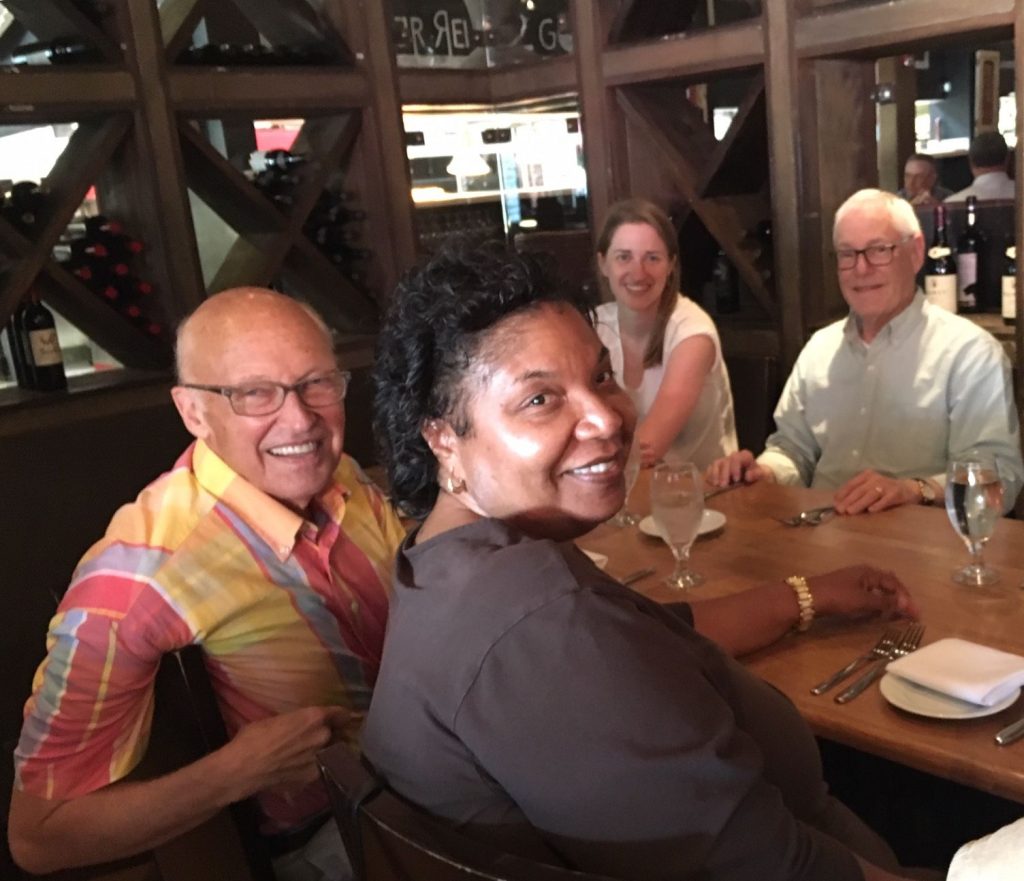
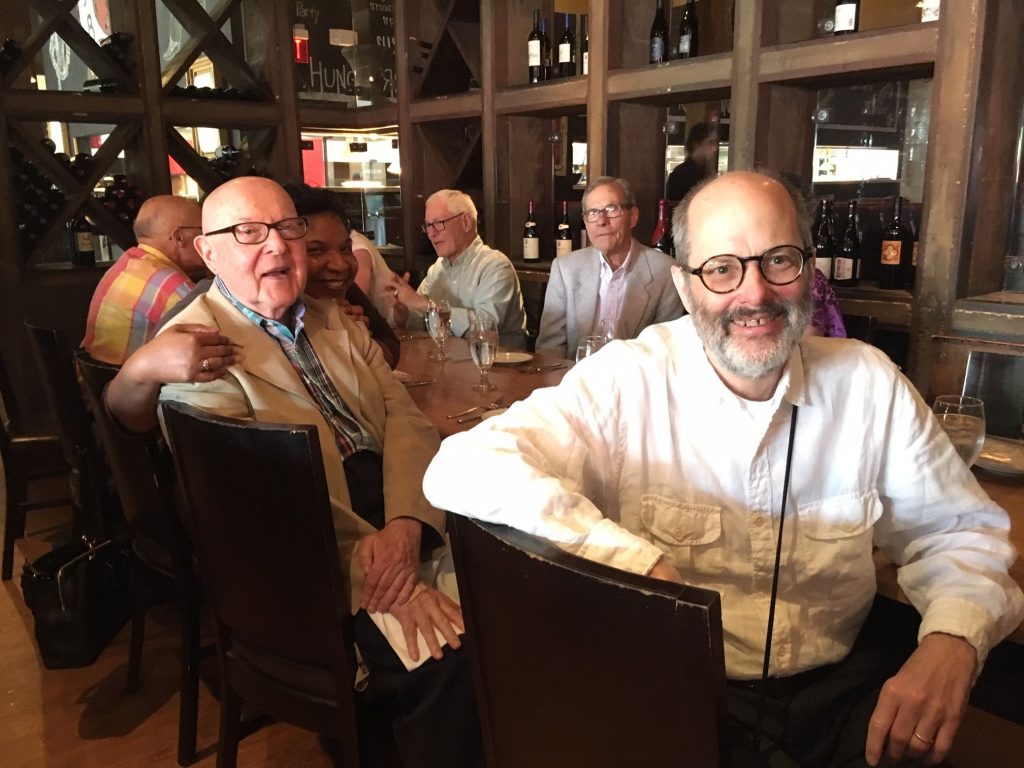
Although L.E. is moving on, current and former members of the department will be glad to know that our much beloved Student Services Manager, Kim Miles, seems to have no intention of following her. On the contrary, last summer a group of her fans gathered to celebrate the 30th anniversary of her employment at UNC, much of it in the Department of Classics. The lunch in late June was followed by a surprise reception at the start of the semester, so that all the returning faculty and graduate students could also have a chance to toast Kim. Congratulations, Kim! Here’s to the next 30 years!
Congratulations are also due to Jennifer Gates-Foster, who was promoted to Associate Professor with tenure as of last July 1st. As everyone who has spent time in academia will appreciate, Jen was immediately rewarded by an increase in service, acting as the Director of Undergraduate Studies for the Curriculum in Archaeology in addition to all her service commitments in our department. Her true reward, however, will come next year, when she will be on leave for the year in order to work full time on the European Research Council funded project “Desert Networks.” In another important development for our program in Classical Archaeology, I am delighted to announce that we have been able to make a new and much needed appointment in classical Greek art and archaeology. Tim Shea received his PhD in Art History from Duke University in 2018 with a dissertation, entitled “Mapping Immigrant Communities through Their Tombstones in Archaic and Classical Athens,” that displays his expertise in Greek material culture, epigraphy, social history, and historical topography. In addition to his excellent training in Greek art and archaeology, he also has extensive experience in directing digital humanities projects and leading study-abroad programs in Greece. With this background, Tim is poised not only to fill some of the gaps left by the retirements of Ken Sams and Mary Sturgeon, but will also to help take the department in new directions. We are thrilled to welcome him to Murphey Hall!
Our ongoing collaboration with the Department of Classics at King’s College London continues to develop. This year’s joint Graduate Colloquium took place in London over a week in October. Hérica Valladares and Jennifer Gates-Foster were the faculty leaders, and were joined by graduate students Amanda Ball, Emily Lime, Jackson Miller, India Natterman, and Rachael Tobin-Dodd. Together, they took part in a KCL graduate seminar, gave presentations around the theme ‘Words and Pictures’, visited museums with KCL faculty, met informally with KCL faculty and students for meals and drinks, and generally had an academically rich as well as enjoyable time in London.Planning for next year is on hold as a result of the pandemic, but we look forward to resuming our collaboration whenever that again becomes feasible.

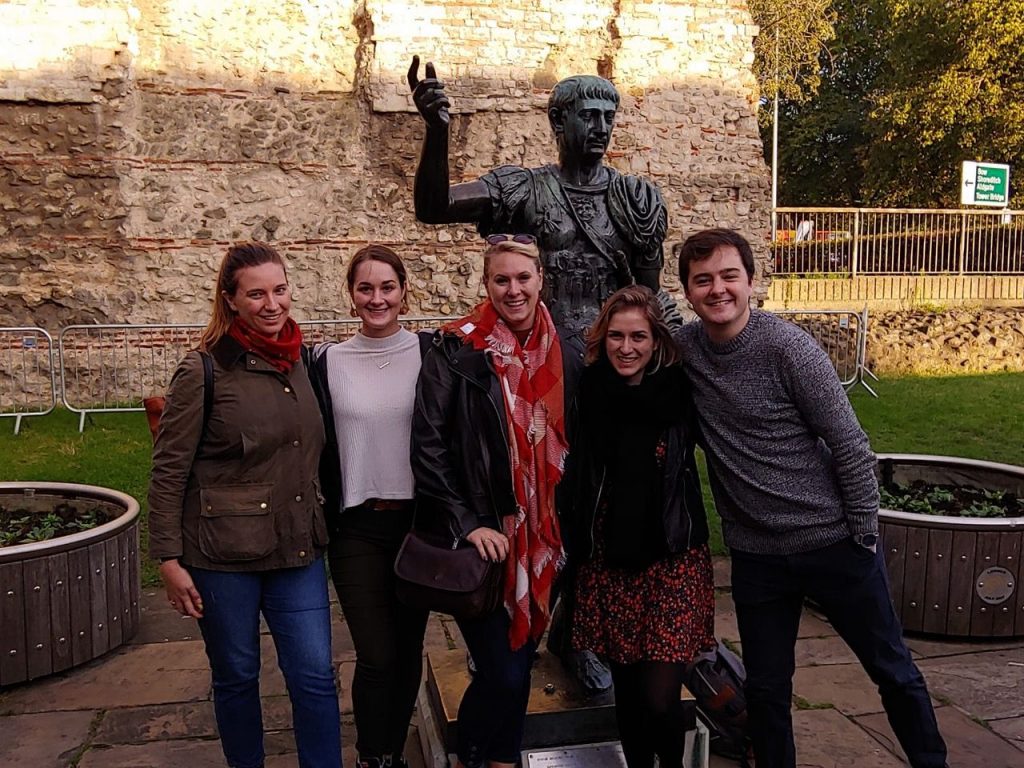
In other graduate student news, a number of our students had notable successes winning awards for next year. Katelin McCullough and Hannah Sorscher both won Teach@Tübingen Fellowships, a program at our new partners at the University of Tübingen that’s designed to give young academics the opportunity to become familiar with research and teaching at a German university and thus broaden their research horizons and build professional ties. They will unfortunately not be able to take up their positions this coming fall, as originally intended, but the program has allowed them to switch their tenure from the academic year to the calendar year. Two of our archaeology students won highly competitive awards to support their dissertation research in Greece, pending the easing of restrictions on international travel: Brandon Baker won the Olivia James Travelling Fellowship from the Archaeological Institute of America, and Melanie Godsey the Homer A. and Dorothy B. Thompson Fellowship from the American School of Classical Studies at Athens. In quite a different area, Emma Warhover won this year’s Albert and Gladys Hall Coates Award, one of the Chancellor’s Awards, which is given annually to the member of Student Congress whose service is judged most outstanding on criteria of statesmanship, commitment and constructive involvement in issues affecting the quality of the University community.
I am also pleased to report that the Department is now awarding graduate student prizes of its own. One of these is the Epps Prize in Greek Studies. This annual award was established in 1983 through a bequest of former faculty member Preston H. Epps, and goes to a student who “shows the greatest interest and promise in coming to understand the Greek language, literature, history, and outlook.” Two years ago we began offering two Epps Prizes every year, one to an undergraduate and one to a graduate student. The winner of this year’s graduate prize is Hannah Sorscher, a fifth-year graduate student whose research interests center on Roman comedy, Greek New Comedy, and women in antiquity. We also established an entirely new award, the Cecil W. Wooten Award for Graduate Student Excellence in Teaching. This award is named in honor of Cecil W. Wooten, who received his PhD from this department in 1972 and returned to join the faculty in 1981. For over thirty years, until his retirement in 2012, Cecil directed the elementary Latin program, training and mentoring scores of graduate students in Latin pedagogy. The new Wooten award is named in his honor, in recognition of his contributions to the training of graduate student teachers in the department. I am delighted to announce that this year’s inaugural award goes to Amanda Ball, a third-year graduate student in Classical Archaeology. Amanda has served as a TA and an instructor of record in a range of courses in Classical Archaeology and Classical Civilization, and has impressed her students and her faculty mentors alike with her creativity and her dedication as an instructor. As one of her students wrote in nominating her, “Amanda Ball goes above and beyond for her students, and considering she is a grad student who also has to balance all her own classes, she inspires and wows me. If anyone deserves this award, it is 110% Amanda Ball.”
As I noted in last year’s letter, we have been working to revise and update the requirements in our graduate degree programs. This year was the first for our new MA track in Classics, which replaces the previous tracks in Greek and Latin. Second-year student Everett Lang was the guinea pig for the new MA exam, which seems from this initial instance to function as we had hoped it would (and Everett did well also!). Next year we will have three more students taking MA exams, so we will have further opportunity to refine the format. This coming fall we will also be offering for the first time two new courses. One of these is CLAS 720, Methods, Perspectives, and Resources in Classics, which will be required for all MA students in the Classics track and is intended to give them a broad introduction to conducting research in the field. Although a number of our faculty contributed to the syllabus, special thanks are due to Patricia Rosenmeyer, who is refining the initial ideas and will be teaching the course in its initial offering. The other is CLAS 710, Proseminar in Pedagogy, a one-credit team-taught course designed to give all our students a broad grounding in teaching Classics at the college level. The Department has a long tradition of valuing undergraduate teaching, and that tradition continues to thrive among both our faculty and our graduate student instructors. Our hope is that this will provide the latter with a more systematic complement to the extensive but more ad hoc mentoring that the faculty already provide.
Although we had planned to finalize revisions to our PhD track in Classics in the spring, Covid-19 disrupted those plans along with so many others. We are now hoping that we can pick that back up in the coming year. When the pandemic hit, our first concern, after the shift to online instruction, was to provide some short-term support for our graduate students, many of whom were put under great stress and lost sources of income over the summer on which they had been counting. First, a generous donor stepped in with a gift that allowed us to make relatively small no-strings-attached Covid-19 Emergency Relief Awards to all our graduate students. Thanks are due to Suzanne Lye for working with the donor to facilitate this gift, and to Kim Miles and Cinnamon Weaver for helping us figure out the mechanisms to make it possible. Inspired by this experience, Suzanne then approached the Women’s Classical Caucus with the idea of establishing a similar fund for graduate students and contingent faculty on the national level; her efforts in this direction paid off and ultimately resulted in the Covid-19 Joint Relief Fund. We all owe thanks to Suzanne for her leadership in this matter. The Department was also able to offer more substantial summer research awards to our graduate students in lieu of the travel awards on which many of them rely for summer funding. Here I must thank Cinnamon Weaver, who provided crucial assistance in working out the logistics of these new awards. Both faculty and graduate students are deeply grateful to our many donors whose generosity enabled us to make these awards.
On the undergraduate front, the University’s new general education curriculum, IDEAs in Action, will come into effect Fall 2021, and our faculty worked hard over the course of the year to prepare for the Department’s participation in it. In addition to our elementary and intermediate sequences in Latin and Greek, which will count as before towards the language requirement, we submitted twenty-three of our courses in Classical Archaeology and Classical Civilization for approval under the new curriculum. Two of us also worked with colleagues in other departments to propose new ‘Triple-I’ courses, large interdisciplinary courses meant to introduce students to a range of academic subject areas and approaches. Jennifer Gates-Foster collaborated with Banu Gökariksel in Geography and Nadia Yaqub in Asian Studies on ‘Borders and Boundaries’, and I collaborated with Fabian Heitsch in Physics & Astronomy and Marc Lange in Philosophy on ‘Myths, Moons, and Methods: Changing Worldviews in Astronomy’. It remains to be seen whether the College can successfully meet the challenge of mounting enough of these courses to require them of all undergraduates, but I think that both Jen and I would agree that the process of designing these courses with colleagues in other departments was intellectually stimulating and that we look forward to teaching them.
In addition to the formal changes involved in the shift to the new general education curriculum, our faculty and graduate students have already been working hard to diversify the instructional techniques that they employ in their teaching. This past year five of our faculty employed Graduate Research Consultants in the courses, to mentor their undergraduate students in research projects on topics ranging from works of art inspired by Ovid’s Metamorphoses (in Sharon James’ LATN 223) to issues of cultural patrimony (in Jennifer Gates-Foster’s First Year Seminar CLAR 051, ‘Who Owns the Past?’). I must also single out for particular mention Suzanne Lye’s First Year Seminar CLAS 059, ‘Ancient Magic and Religion’, for which she won a Makerspace Program Course Development Grant to support her incorporation of making-centered projects designed to further students’ engagement with the course materials in ways beyond traditional classroom approaches. Suzanne’s work in this course was featured in an article in the College’s online magazine Endeavors.
Our students, along with the wider community, also had the opportunity to see a very different use of materials from classical antiquity during the early March visit to our campus of Rhodessa Jones and the Medea Project: Theater for Incarcerated Women. This San Francisco-based performance group features women of color and formerly incarcerated women and employs ancient myth as a tool for helping incarcerated women reclaim their lives through the creative process. Their visit kicked off with a public performance of a new show that they created especially for their visit, ‘Rituals of Resilience’, followed by a conversation between performers and audience members.
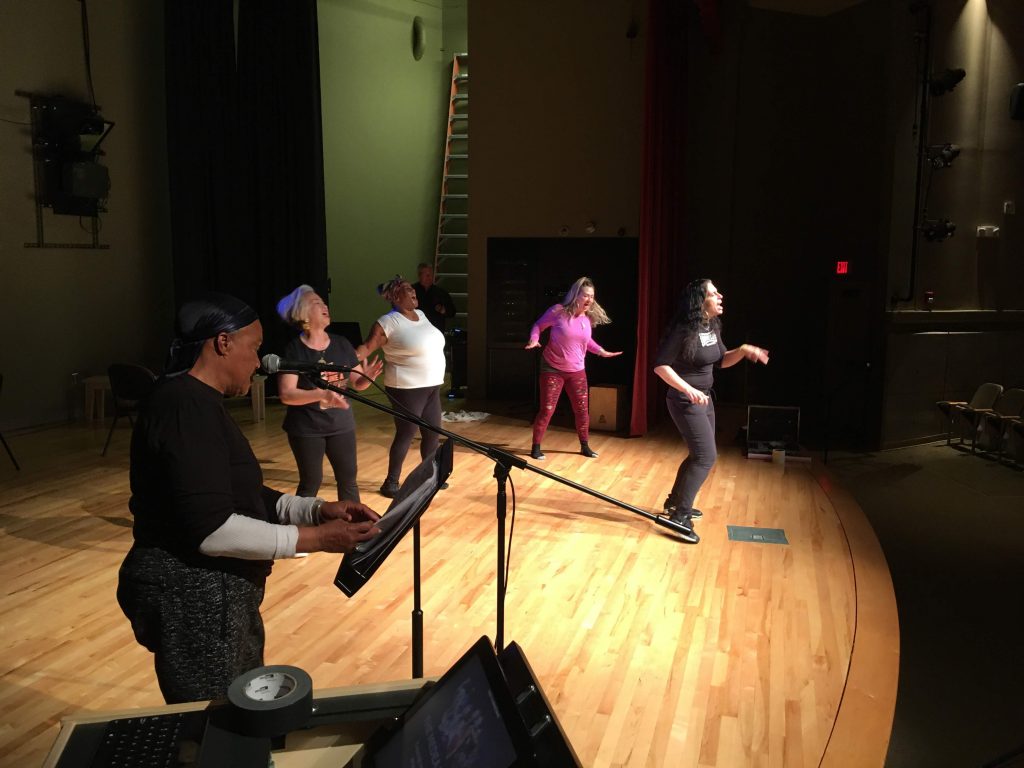
The next day featured a lunchtime seminar with faculty, graduate students, and undergraduates, and an evening reception with faculty and students. Patricia Rosenmeyer originally conceived of inviting the group as part of the University’s ‘Countering Hate’ initiative, and she and Al Duncan, with crucial support from graduate student Kelly McArdle and our office staff, handled all the complex logistics of the visit. The visit was a great success, a transformative experience for many of our students, and one on which we hope to build further in the future.
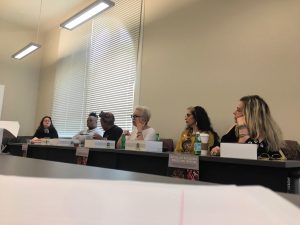
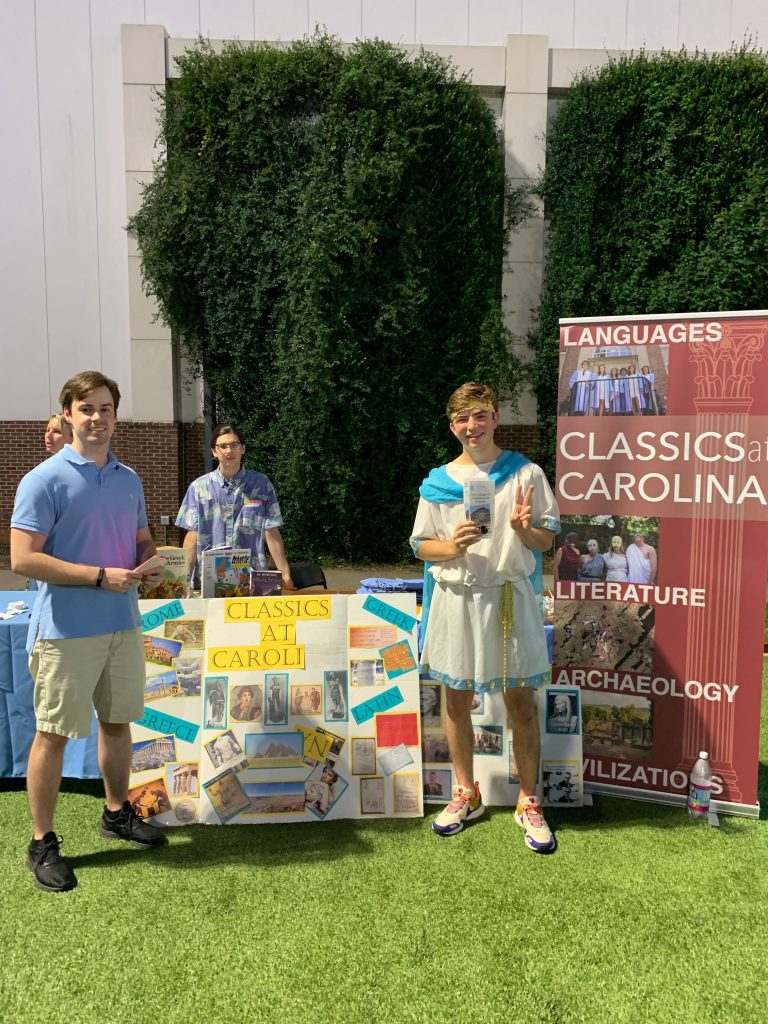
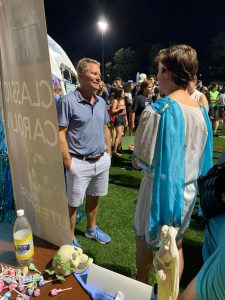
The Medea Project was the last department event that we were able to hold before Covid-19 brought all our extra-curricular activities to a halt. So, for example, although the annual undergraduate t-shirt contest took place as usual, we regretfully decided that the logistics of printing and distributing the actual t-shirts would be too complex. I am nevertheless pleased to announce that the winner of this year’s contest is Tessa McGuire, from Katie Tardio’s LATN 101 class, for the Mae-West-in-ancient-Rome slogan ‘Estne illud volumen in toga tua, aut videsne me laetus?’, ‘Is that a scroll in your toga or are you happy to see me?’. We did, however, take part in FallFest at the start of the year, thanks to the efforts of Rachael Tobin-Dodd, this year’s Watlington Assistant for Undergraduate Outreach, and a dedicated group of graduate and undergraduate volunteers.
In other undergraduate news, I am delighted to announce that Arjun Guidroz was one of this year’s winners of the Manson A. Stewart Undergraduate Award from the Classical Association of the Middle West and South. Arjun is the ninth student in our program to win this award over the last nine years; next year he will be taking over as president of our local chapter of Eta Sigma Phi. Congratulations, Arjun! We had planned to host a ceremony and reception at the end of the spring semester to recognize the achievements of Arjun and our many other outstanding undergraduates, but that, along with our regular departmental commencement ceremony, was of course cancelled. Thanks to the initiative of Janet Downie, however, with the crucial assistance of Suzanne Lye and Kim Miles, we were able to organize a virtual recognition ceremony for both our prize-winners and our graduates, featuring propemptic remarks by Jim O’Hara, in which virtually all our faculty were able to take part. Thanks to their efforts, we were able to provide our students with a memorable end to a memorable year.
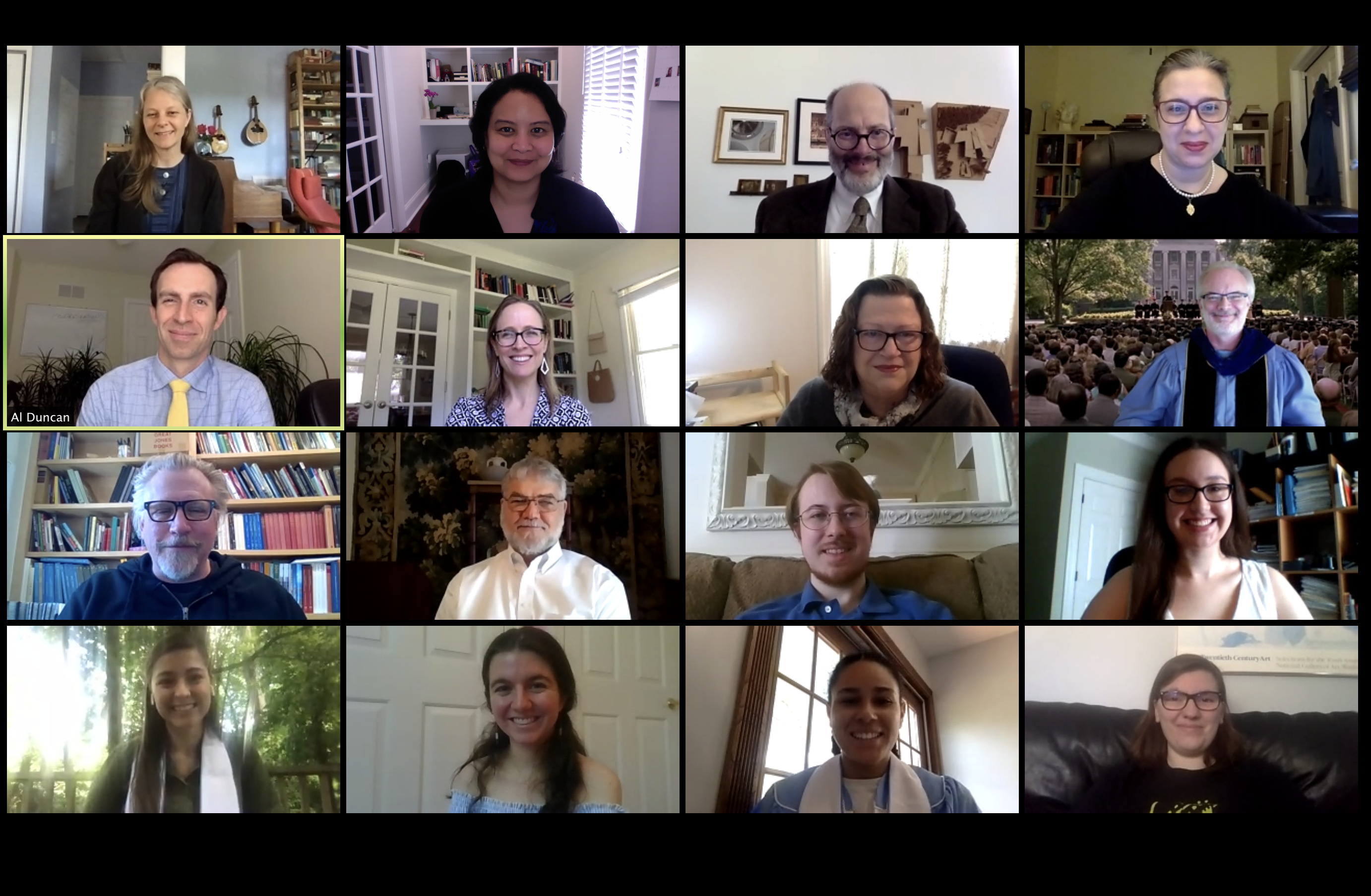
In closing, I must thank all the people who have contributed to our success this year. First and foremost are my faculty colleagues in the department, who constantly go above and beyond duty in their dedication to our students and our collective enterprise. I am grateful as well for the support of our Senior Associate Dean Elizabeth Engelhardt and our Dean, Terry Rhodes. Our students, of course, are our fundamental raison d’être, and they are essential to our success not only through their excellence as students but, as should be clear from my letter, for their many contributions to the life of the department. As always, the true sine qua non is our office staff, Cinnamon Weaver, Kim Miles, and L.E. Alexander, who keep us all in line and make sure that things get done correctly and on time. Lastly, I am as always very grateful to our many friends and supporters from outside the department. It is thanks to their generosity that we have the resources we need to make good our potential. As the various reports both here and elsewhere in this newsletter make clear, we continue to do just that, and we are deeply appreciative to all those who enable our ongoing success.